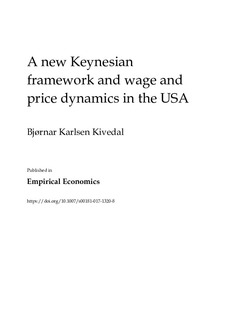A new Keynesian framework and wage and price dynamics in the USA
Journal article, Peer reviewed
Accepted version
Permanent lenke
http://hdl.handle.net/11250/2492129Utgivelsesdato
2017Metadata
Vis full innførselSamlinger
- Institutt for samfunnsøkonomi [1085]
- Publikasjoner fra CRIStin - NTNU [37737]
Sammendrag
This paper investigates theoretical implications from a new Keynesian model focusing on the labor market, by imposing them as testable restrictions in an estimated vector error correction model on US data from 1982Q3 to 2016Q1. By this, I conduct an important, but rarely addressed, step in assessing the empirical relevance of a theoretical new Keynesian model. Another advantage of this approach is that the cycle and trend components of the data are separated when imposing the testable restrictions, such that there is no need to filter the data series prior to estimation. The results show that most of the properties pertaining to the theoretical model cannot be rejected when imposed as restrictions. The new Keynesian model on the labor market is thus found to be empirically relevant. Furthermore, the estimated econometric model explains a large degree of the wage and price dynamics in the USA, such that the paper also provides an estimated macroeconometric model.
